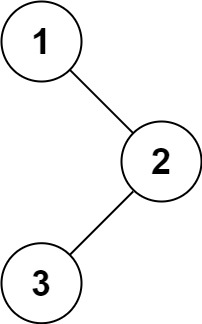LeetCode-in-All
94. Binary Tree Inorder Traversal
Easy
Given the root of a binary tree, return the inorder traversal of its nodes’ values.
Example 1:

Input: root = [1,null,2,3]
Output: [1,3,2]
Example 2:
Input: root = []
Output: []
Example 3:
Input: root = [1]
Output: [1]
Example 4:

Input: root = [1,2]
Output: [2,1]
Example 5:

Input: root = [1,null,2]
Output: [1,2]
Constraints:
- The number of nodes in the tree is in the range
[0, 100]. -100 <= Node.val <= 100
Follow up: Recursive solution is trivial, could you do it iteratively?
Solution
import com_github_leetcode.TreeNode
import scala.collection.mutable.ListBuffer
/*
* Definition for a binary tree node.
* class TreeNode(_value: Int = 0, _left: TreeNode = null, _right: TreeNode = null) {
* var value: Int = _value
* var left: TreeNode = _left
* var right: TreeNode = _right
* }
*/
object Solution {
def inorderTraversal(root: TreeNode): List[Int] = {
if (root == null) {
List.empty
} else {
val answer = ListBuffer[Int]()
inorderTraversal(root, answer)
answer.toList
}
}
private def inorderTraversal(root: TreeNode, answer: ListBuffer[Int]): Unit = {
if (root == null) {
return
}
if (root.left != null) {
inorderTraversal(root.left, answer)
}
answer += root.value
if (root.right != null) {
inorderTraversal(root.right, answer)
}
}
}

